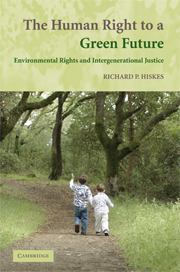Book contents
- Frontmatter
- Contents
- Acknowledgments
- Introduction
- 1 Environmental Human Rights and Intergenerational Justice
- 2 Emergent Human Rights, Identity, Harms, and Duties
- 3 Reflexive Reciprocity and Intergenerational Environmental Justice
- 4 Cosmopolitan Ethics, Communal Reciprocity, and Global Environmentalism
- 5 Toward a Global Consensus on Environmental Human Rights
- 6 Human Rights as Inheritance: Instituting Intergenerational Environmental Justice
- 7 Conclusion: Environmental Justice and the Emergent Future of Human Rights
- References
- Index
3 - Reflexive Reciprocity and Intergenerational Environmental Justice
Published online by Cambridge University Press: 01 July 2009
- Frontmatter
- Contents
- Acknowledgments
- Introduction
- 1 Environmental Human Rights and Intergenerational Justice
- 2 Emergent Human Rights, Identity, Harms, and Duties
- 3 Reflexive Reciprocity and Intergenerational Environmental Justice
- 4 Cosmopolitan Ethics, Communal Reciprocity, and Global Environmentalism
- 5 Toward a Global Consensus on Environmental Human Rights
- 6 Human Rights as Inheritance: Instituting Intergenerational Environmental Justice
- 7 Conclusion: Environmental Justice and the Emergent Future of Human Rights
- References
- Index
Summary
It is not the office of a man to receive gifts. How dare you give them? We wish to be self-sustained. We do not quite forgive a giver. The hand that feeds us is in some danger of being bitten.
Ralph Waldo Emerson, “Gifts”As pointed out in Chapter 1, theories of justice, especially contractually based ones such as those presented by Rawls, Gauthier, Barry, or Nozick, do not, in Wilfred Beckerman's (1997) phrase, “time-travel very well” (p. 395). In other words, moral consideration of future generations typically is not an essential feature of such theories owing to the fact that relations with the future cannot meet what Hume called the “circumstances of justice.” Although all of these theories (and especially Rawls's) acknowledge obligations to the future, these obligations are held to be outside the demands of justice. In other words, although being concerned for the future might be proof of moral uprightness, justice in particular does not actually require us to care about future generations. Keeping such future-oriented obligations can seem to resemble merely gift giving, because the relationship invoked by the alleged obligation lacks an essential element presumed necessary for a justice relationship to exist. It is that essential reciprocity that defines justice “as fairness” (Rawls), as “mutual advantage” (Barry), or in other contractual terms that simply cannot be present in relations with future generations.
- Type
- Chapter
- Information
- The Human Right to a Green FutureEnvironmental Rights and Intergenerational Justice, pp. 48 - 68Publisher: Cambridge University PressPrint publication year: 2008



